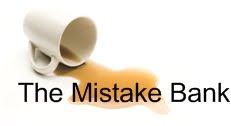Today I read a very interesting piece by Sarah Green in the HBR Blog Network. Entitled "Star Performers Need Extra Affirmation After a Setback," it references a study by Jennifer Carson Marr of Georgia Institute of Technology and Stefan Thau of London Business School, which studied baseball players who lost their salary arbitration hearings. The study finds that the performance of star players suffered after the ruling, even though they had plenty of incentive (playing for next year's salary) to succeed. The analogy is that star performers in business can suffer the same pitfall after a career setback, such as a failed project.
The analogy makes sense - business stars don't fail very often, and tend to be showered with praise along the way. An objective failure, therefore, can feel devastating since it's so out of step with the norm.
Green recommends affirmation for star performers and their managers to help them deal with these situations. I'd also add some tough love - before the fact. As part of the career development process, managers should work with stars to expose them to low-risk failure situations - i.e., a small project that faces significant obstacles - to practice managing adversity and resourcefulness. An example would be applying to a conference to do a speech when the organizers are looking for more-senior executive speakers.
If the employee wins the assignment, it's a significant achievement. If she is rejected, the downside is very low, and the lessons of adversity and failure are experiences. When the bigger failure inevitably comes, she will be better prepared to handle it.
Tuesday, February 11, 2014
Tuesday, February 4, 2014
Late-night emails intimidate CEO's staff
From Adam Bryant's Corner Office series. Bryant's new book is called Quick and Nimble: Lessons from Leading CEOs on How to Create a Culture of Innovation. This story is from Dawn Zier, CEO of NutriSystem.
We are always looking for more stories to add to the Mistake Bank - especially if you're NOT a CEO. Contact us - mistakebank (at) caddellinsightgroup (dot) com if you have something to share, anonymously or otherwise.
I had my first child when I was 30, and it was very important for me to have balance. So my idea of balance was that I would go to work during the day, come home, spend time with my child, and then after everybody went to sleep, I would do work. So it was very common for people to get emails from me at 2 or 3 in the morning.
It was just my way of managing my life, but what I didn’t realize is that it freaked everybody out. Somebody said, “Do you really expect us to get back to you at 3:30 in the morning?” I said: “No, I assume that you’re sleeping. I don’t have that expectation at all.” But the feedback I got was that it was disturbing the people that I was managing.
I ended up having a meeting with my team. I’m pretty direct and big on candor, and I had to explain to them that we all need to find our balance. I expect a lot out of you, and you expect a lot out of me. This is just my way of doing my job, and I’m not going to prescribe how you do your job. I don’t expect you to be up all night. After we had a direct conversation about it, everybody was cool with it. So one of my early lessons was really trying to be attuned to things and making sure that you have an open dialogue so things don’t become issues.
We are always looking for more stories to add to the Mistake Bank - especially if you're NOT a CEO. Contact us - mistakebank (at) caddellinsightgroup (dot) com if you have something to share, anonymously or otherwise.
Subscribe to:
Posts (Atom)
